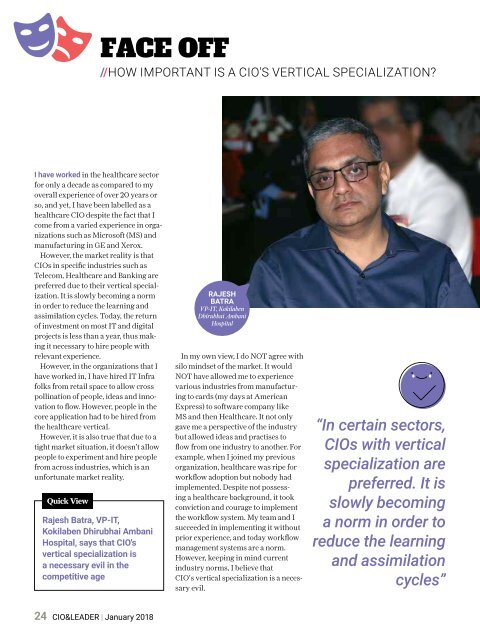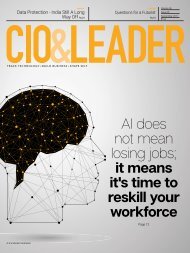CIO & LEADER-Issue-10-January 2018 (1)
The cover story on CIO&Leader's January issue is a dive into the skills that CIOs are going to develop and hire in 2018
The cover story on CIO&Leader's January issue is a dive into the skills that CIOs are going to develop and hire in 2018
You also want an ePaper? Increase the reach of your titles
YUMPU automatically turns print PDFs into web optimized ePapers that Google loves.
FACE OFF<br />
//HOW IMPORTANT IS A <strong>CIO</strong>'S VERTICAL SPECIALIZATION?<br />
I have worked in the healthcare sector<br />
for only a decade as compared to my<br />
overall experience of over 20 years or<br />
so, and yet, I have been labelled as a<br />
healthcare <strong>CIO</strong> despite the fact that I<br />
come from a varied experience in organizations<br />
such as Microsoft (MS) and<br />
manufacturing in GE and Xerox.<br />
However, the market reality is that<br />
<strong>CIO</strong>s in specific industries such as<br />
Telecom, Healthcare and Banking are<br />
preferred due to their vertical specialization.<br />
It is slowly becoming a norm<br />
in order to reduce the learning and<br />
assimilation cycles. Today, the return<br />
of investment on most IT and digital<br />
projects is less than a year, thus making<br />
it necessary to hire people with<br />
relevant experience.<br />
However, in the organizations that I<br />
have worked in, I have hired IT Infra<br />
folks from retail space to allow cross<br />
pollination of people, ideas and innovation<br />
to flow. However, people in the<br />
core application had to be hired from<br />
the healthcare vertical.<br />
However, it is also true that due to a<br />
tight market situation, it doesn’t allow<br />
people to experiment and hire people<br />
from across industries, which is an<br />
unfortunate market reality.<br />
Quick View<br />
Rajesh Batra, VP-IT,<br />
Kokilaben Dhirubhai Ambani<br />
Hospital, says that <strong>CIO</strong>'s<br />
vertical specialization is<br />
a necessary evil in the<br />
competitive age<br />
RAJESH<br />
BATRA<br />
VP-IT, Kokilaben<br />
Dhirubhai Ambani<br />
Hospital<br />
In my own view, I do NOT agree with<br />
silo mindset of the market. It would<br />
NOT have allowed me to experience<br />
various industries from manufacturing<br />
to cards (my days at American<br />
Express) to software company like<br />
MS and then Healthcare. It not only<br />
gave me a perspective of the industry<br />
but allowed ideas and practises to<br />
flow from one industry to another. For<br />
ex<strong>amp</strong>le, when I joined my previous<br />
organization, healthcare was ripe for<br />
workflow adoption but nobody had<br />
implemented. Despite not possessing<br />
a healthcare background, it took<br />
conviction and courage to implement<br />
the workflow system. My team and I<br />
succeeded in implementing it without<br />
prior experience, and today workflow<br />
management systems are a norm.<br />
However, keeping in mind current<br />
industry norms, I believe that<br />
<strong>CIO</strong>'s vertical specialization is a necessary<br />
evil.<br />
“In certain sectors,<br />
<strong>CIO</strong>s with vertical<br />
specialization are<br />
preferred. It is<br />
slowly becoming<br />
a norm in order to<br />
reduce the learning<br />
and assimilation<br />
cycles”<br />
24 <strong>CIO</strong>&<strong>LEADER</strong> | <strong>January</strong> <strong>2018</strong>














